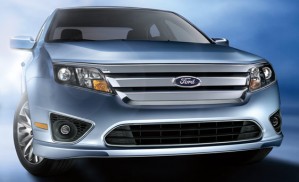
Better products, like the new Ford Fusion Hybrid - rather than jingoistic slogans - may be why more motorists now say they're ready to "Buy American."
It’s become a tired cliché. “Buy American,” a phrase trotted out by generations of Detroit executives hoping to win back the motorists who’ve increasingly shifted, over the years, to Asian and European imports.
“Buy America,” proclaimed Lee Iacocca, hoping to head off bankruptcy with 1980’s first automotive bailout. “Buy America,” crowed his successors, one by one, all the way up to the Cash-for-Clunkers program which, it turned out, sold a lot more Japanese sheet metal than Detroit iron.
But could American buyers really be ready to embrace the concept, once again, and turn to Motown for their transportation needs?
That’s the rather surprising indication of a new survey by the Consumer Reports National Research Center. In a first-ever survey of motorist intentions, it found that 81% of new-car buyers said they would be likely or very likely consider a Detroit product, compared with just 47% who said the same thing about an Asian model, and 46% who’d similarly consider a European offering.
That might come as a surprise to folks who follow the industry, considering that imports, overall, now control more than half the American auto market, while industry data routinely show that top foreign brands, such as Toyota regularly score higher when it comes to “consideration” than any domestic brand.
The results are even more surprising when you consider that Detroit executives routinely fire shots at Consumer Reports for alleged import bias.
The non-profit group’s research finds that Ford Motor Co. “has benefited the most from the recent turmoil in the automotive market, with the largest gain in new-car buyers who say that they are likely to consider buying a Ford model—up 17 percentage points compared with a year ago.”
By comparison, General Motors has gained a more modest 6 point over the last year and, disconcertingly for the smallest Detroit maker, the number of folks saying they’d be likely or very likely to consider a Chrysler model has tumbled a full 25 points. Then again, it is an Italian-controlled company, these days, so it might be harder to shout, “Buy American” when you’re hawking a Dodge Ram or the planned, Chrysler version of the Fiat 500 minicar.
The CR Auto Pulse survey found that fuel economy, quality, safety, price and value are, in descending order, the most important factors for buyers choosing between products. Detroit’s recent improvement in various quality rankings has obviously helped it gain ground – or hurt, in the case of defect-plagued Chrysler – as has the collective effort by the Big Three to push fuel economy in marketing campaigns, like the one for Ford’s Fusion Hybrid, which notes the new model gets 4 mpg more than the comparable Toyota Camry Hybrid.
Clearly, the days when Detroit can rally American motorists to its cause simply by shouting jingoist slogans has come to an end. But the opportunity is there to win back buyers with better product.

Things seem to be getting confusing. The Ford Fusion is made in the state of Sonora and the Subaru Legacy is made in the state of Indiana. I’m pretty sure Indiana is still part of the USA but I can’t seem to find the state of Sonora on any of my maps. Could the Subaru Legacy actually be an American car and the Ford Fusion actually be a foreign make? It’s getting harder to figure out how to be patriotic. Last time I looked at a Big Three V8 or even a Saturn engine block it had “Hecho en Mexico” cast into the block. I’m getting confused, anyone else?